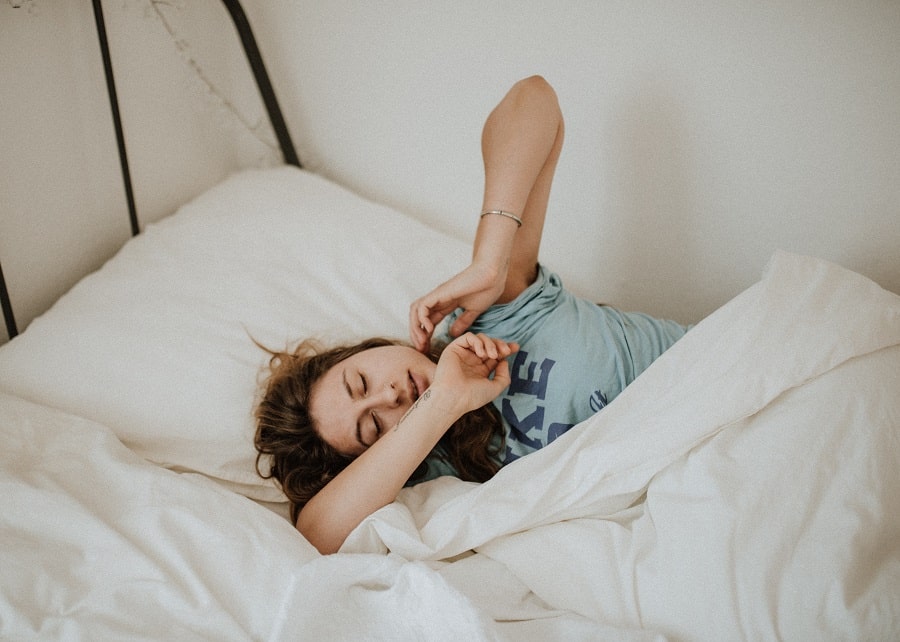Twitching which is a sudden involuntary movement that can occur at any time even in a deep sleep can disrupt your sleep and reduce your overall health and well-being. You can also engage in yoga for de-stressing yourself.
 What Causes Twitching In Your Sleep Jacksonville Sleep Center
What Causes Twitching In Your Sleep Jacksonville Sleep Center
The term myoclonus refers to involuntary spasms that involve a muscle or group of muscles.

Twitching in your sleep. Anxiety or Stress Thoughts that make you anxious or stressed assist in keeping the brain active even when your body is trying to relax and drift off to sleep. The twitching during sleep is rhythmic and it disrupts sleep. A hiccup is a type.
It may affect smaller muscles or even cause movements of the arms or legs. S Sleep myoclonus can also cause a sensation of falling as you drift off to sleep. The twitching itself is not a disorder.
The occasional twitching at night is nothing to worry about but chronic muscle spasms may point to different health conditions. At very least experiencing twitching in your sleep can cause an. Twitching in sleep is academically known as a hypnagogic jerk or a hypnic jerk.
Hiccups are another form of myoclonus. A person with sleep myoclonus may experience nonrhythmic muscle twitching during sleep. The brief twitches and jerks of sleep myoclonus commonly involve your lips toes fingers and eyes.
Patients who have PLMD may experience fatigue during the day even though they may not wake every time the jerking movements occur. Sleep myoclonus is a condition in which there is a sudden jerking or twitching movement that affects a muscle and occurs during sleep. The fear of suffering a twitch is also something that could set off a lot of issues and it could dramatically disrupt your bedtime.
Hypnagogic jerks are also commonly known as hypnic jerks or sleep starts. You may have uncontrollable movements of your arms legs or body. But a hypnagogic jerk or a hypnic jerk is just a medical term to describe a sleep twitch that strong sudden jolt that you or your partner might get from time to time as you are drifting off to sleep via Healthline.
Sleep twitching that disrupts your rest can reduce your energy level and throw your mood off-balance while affecting your memory and creativity. A lot of twitching during sleep can indicate a sleep disorder. As twitching while sleeping may be an indicator of an ongoing stress it is a good option to relax yourself by taking deep breaths and try relaxing as often as possible.
It is involuntary meaning that it is not under conscious control and not done on purpose. The muscle spasms may occur spontaneously or may be induced by sound light or other external stimuli. When talking about the causes of twitching at the time of sleep the most common reasons include.
Anxiety as well as panic attacks could be caused by repeated sleep starts. It tends to happen just as the person is transitioning from a wakeful state to a sleeping. However as weve already stated there are certain sleep disorders which could lead to it.
Deep Breathing Helps Get Rid Of Twitching While Sleeping. While even healthy individuals move about more than expected while sleeping muscle twitching during dreams can be a harbinger of neurodegenerative diseases. The occasional twitching at night is nothing to worry about but chronic muscle spasms may point to different health conditions.
Try some pre-sleep yoga or gentle. It is important to determine the type of twitches you are having in order to find a solution. A myoclonus is an involuntary muscle twitch.
There are many different causes of nighttime twitching many of which are treatable. Not all sleep twitches are the same but most can be treated. While twitching in your sleep is common for some people there are ways to stop it.
Hypnogogic jerks are also sometimes called sleep twitches night starts or myoclonic jerks. No matter what its. A hypnic jerk is an involuntary twitch of one or more muscles that occurs as a person is falling asleep.
Its important to relax fully before going to bed. In spite of its rather dreadful sounding name sleep jerks or twitches arent symptoms of some strange disease. At very least experiencing twitching in your sleep can cause an increase in nighttime wakefulness and decline in sleep quality.
It got its name because these twitches usually occur while you are in the hypnagogic state which is in between being awake and asleep. Its sometimes referred to as periodic leg. These movements do not wake you or your sleep partner.
Periodic limb movement disorder PLMD is a condition characterized by twitching flexing and jerking movements of the legs and arms during sleep. Periodic limb movement disorder PLMD is a sleep disorder that involves jerking movements that last about 30 seconds.